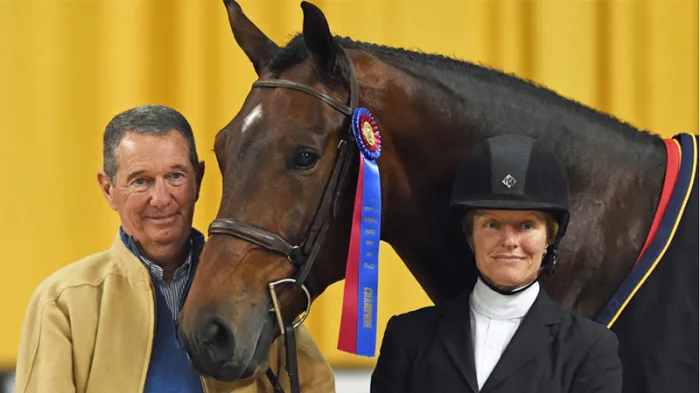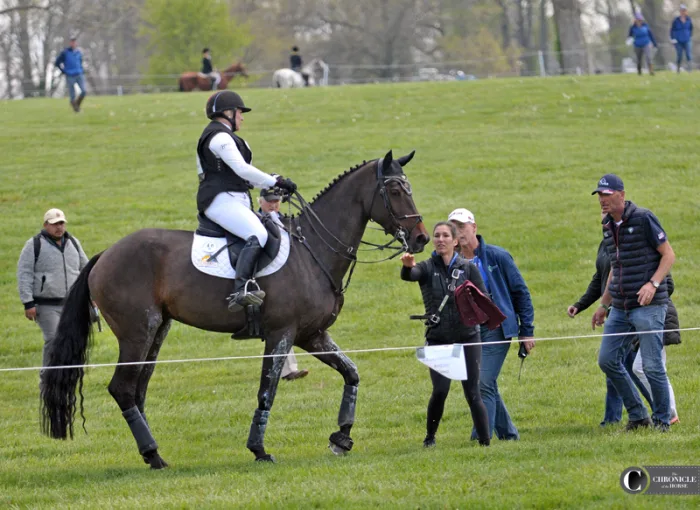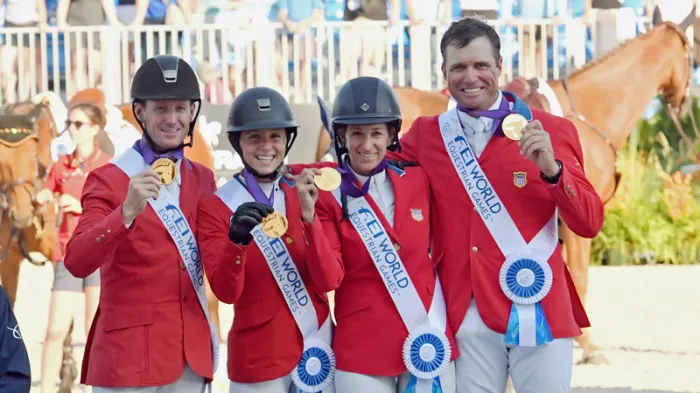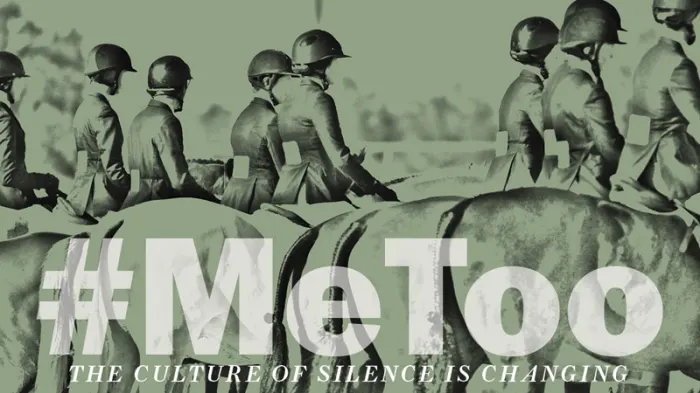While creating COTH’s Top 10 lists, we looked at the most-read stories we published this year, but many meaningful events in 2018 could not be condensed to a single story. They spanned months, earned several headlines and sparked conversation.
Here are the most impactful stories of 2018 (in chronological order):
 Kelley Farmer, Larry Glefke And The Overhaul Of USEF Drug Testing
Kelley Farmer, Larry Glefke And The Overhaul Of USEF Drug Testing
In January of 2017 hunter trainers Larry Glefke and Kelley Farmer were reprimanded following a positive test for GABA on a horse in their care. What followed was a drawn out legal proceeding that made headlines into June of 2018 and brought USEF’s drug testing process into question.
Early in 2018, USEF officials announced they had temporarily lifted the suspensions pending further arbitration, which meant Farmer and Glefke were reinstated as USEF members. Later that month, USEF voided the proceeding and vacated all penalties and suspensions due to a laboratory error in the handling of the blood samples. In their response, USEF representatives explained the error further.
On Feb. 1, USEF President Murray Kessler released a letter to membership discussing steps that were being taken to prevent future errors. The next day, Kelley Farmer was back in the show ring on a horse named Shameless. Moroney released an additional letter that outlined changes made to all steps of the testing process. Glefke and Farmer’s legal team held an open forum to lay out the details of their legal wranglings with the federation. USEF members got an update on the federation’s review of its drugs and medications program after the midyear board meeting in June. In October USEF officials announced a Letter of Intent to develop an equine regulatory testing laboratory with the University of Kentucky.
Lola Chambless, M.D., delivered a sobering presentation to the 2016 USHJA Annual Meeting regarding the number of horseback riders admitted to hospitals with “a sports-related traumatic brain injury.” The ensuing discussion in the hunter/jumper world lead COTH senior reporter Mollie Bailey to commit months to writing a two-part series on the state of concussions in the horse industry. The series was published in the Feb. 26 & March 5 and the March 12 & 19 issues, and they also appeared online.
The first part examined what we know about concussions and traumatic brain injuries in horseback riders, and the second installment focused on the changing culture of helmet use and what goes into creating the standards approved helmets must meet.
ADVERTISEMENT
The Chronicle also published a brief guide to improve awareness of concussion safety, a blog by junior rider Aubrienne Krysiewicz-Bell recounting her frightening experience with a concussion, a blog by Lauren Sprieser about her own decision to wear helmets, and a Throwback Thursday regarding an image of a rider fall and a hunt cap flying off, which planted the seeds for the helmet discussions happening today.
Blood Rules And Horse Welfare In Eventing
 Marilyn Little was leading after dressage in the Land Rover Kentucky Three-Day Event, but while warming up for cross-country she noticed a small amount of blood on RF Scandalous’ lip. She reported it to the official veterinary delegate, ground jury and stewards and was cleared to begin her round. At the end of the course, RF Scandalous had blood on her mouth again, and social media took notice.
Marilyn Little was leading after dressage in the Land Rover Kentucky Three-Day Event, but while warming up for cross-country she noticed a small amount of blood on RF Scandalous’ lip. She reported it to the official veterinary delegate, ground jury and stewards and was cleared to begin her round. At the end of the course, RF Scandalous had blood on her mouth again, and social media took notice.
The original report on the blood was one of the most-read news pieces of the year, and it sparked conversations about the public image of eventing, the inherent risks to event horses on cross-country, and rules about blood on horses during competition. Little responded directly to the controversy and the backlash from social media.
In May, Kentucky champion Oliver Townend received an official warning regarding his over-use of the whip on Ballaghmor Class and Cooley SRS during cross-country at the the Mitsubishi Motors Badminton CCI****, where he finished second overall. This reignited concerns about horse welfare in eventing.
As a companion to the discussions, COTH ran a piece published in the Sept. 26 & Oct. 3, 2016, issue, which offered an in-depth examination of blood rules after the Olympic Games in Rio de Janeiro, where four show jumpers were disqualified for excessive use of spurs.
In addition to the #MeToo and SafeSport series’ place in our Top 10 Best Stories of 2018 countdown, COTH reporter Mollie Bailey’s exhaustive and empathetic work also sparked arguably the biggest discussion in the horse world this year.
DiAnn Langer shared her personal account of abuse, which ran online and in the April 9 & 16 issue of the Chronicle, and COTH President/Executive Editor Beth Rasin penned an explanation as to why COTH felt it was important to bring past abuses to light and “bring politics” into an equestrian magazine.
ADVERTISEMENT
USEF officials announced at their midyear board meeting that all USEF adult members with a competing membership would be required to take SafeSport training, and in August that rule change became official, to take effect Jan. 1, 2019.
COTH kept up with multiple changes to the SafeSport sanctions list, which may all be found in the SafeSport tag.
The 2018 World Equestrian Games
 Rarely does a world championship run completely according to plan, but this year’s FEI World Equestrian Games were especially eventful. Issues ranged from concerns about the readiness of the facility at the Tryon International Equestrian Center—which lead TIEC CEO Mark Bellissimo to release a personal statement in response—to the added challenges of weather from Hurricane Florence that forced rescheduling and cancellation of some events.
Rarely does a world championship run completely according to plan, but this year’s FEI World Equestrian Games were especially eventful. Issues ranged from concerns about the readiness of the facility at the Tryon International Equestrian Center—which lead TIEC CEO Mark Bellissimo to release a personal statement in response—to the added challenges of weather from Hurricane Florence that forced rescheduling and cancellation of some events.
The endurance competition dominated headlines as it was incorrectly started, rescheduled, and then canceled due to hazardous weather conditions before all the entrants crossed the finish line. The endurance community analyzed the fallout, and the FEI launched an investigation and appointed a temporary committee to assess the state of the sport of endurance. They posted their findings in November.
But there were bright moments amid the chaos. Rebecca Hart won the first para-dressage medal ever for the United States, Laura Graves boosted the U.S. dressage team to silver and took individual silver in front of a home crowd, and the U.S. show jumping team secured gold in a thrilling jump-off against Sweden. The United States also won team gold in the driving and reining events.
Post Games, FEI officials announced they were accepting bids for the next WEG, but were also open to bids for individual world championships, meaning this may have been the last WEG with all eight disciplines in one place.
If you’re just following COTH online, you’re missing tons of unique content.
Each print issue of the Chronicle is full of in-depth competition news, fascinating features, probing looks at issues within the sports of hunter/jumper, eventing and dressage, and stunning photography.









